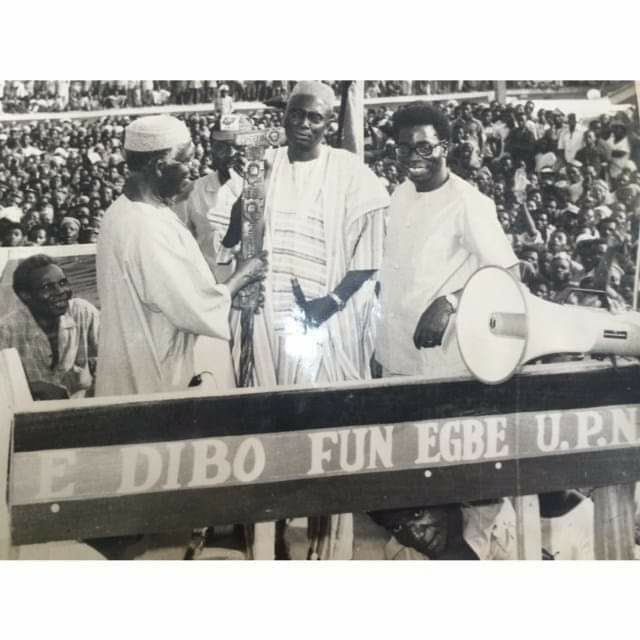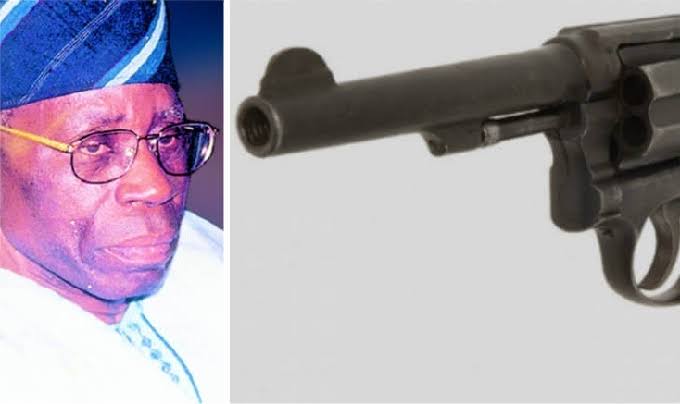I will always remember the Great ‘IGE’ – the Cicero of Esa-Oke. As we commemorate his person, and today his gruesome assassination about 18years ago.
Gradually, the nation’s psyche is being both subtly and brazenly retuned to accept not simply corruption as the norm of social relationships, but its heightened product, impunity, as a national emblem. We move on grinning at shameful events as if we are animals. The shameful killing of a sitting Minister for Justice and the eventual injustice in the search of his yet to be known assassins gives me the reinforcements to always be mindful of those bigger than the law when fighting for human rights.

Photo: CHIEF BOLA IGE AND CHIEF OBAFEMI AWOLOWO CAMPAIGNING FOR UPN IN OYO STATE BETWEEN 1978 AND 1983.
His widow died of high blood pressure, seeing the games and gimmicks in the trial of the those accused of being suspects. Bola’s son, Muyiwa Ige said, “My Mum told me to move out of Nigeria with family and siblings and never to return or have anything to do with the country”. Chief Bola would have been celebrating 90years on earth next September if he is alive.
READ ALSO: EXCLUSIVE: NBA Demand For Immediate Suspension Of DSS DG
Chief James Ajibola Idowu Ige was born on the 13th of September 1930 in Zaria in Northern Nigeria. His parents were natives of Esa-Oke town, in old Oyo state(now in Osun state). He studied at the Ibadan Grammar School (1943-1948), then went to the University of Ibadan and ending up at the University College London, graduating with a Law degree in 1959. He was called to the bar in London’s Inner Temple in 1961.

Ige established Bola Ige & Co. in 1961 and later became a Senior Advocate of Nigeria (SAN). During Nigeria’s first republic (1963-1966), at the age of 31, he became the National Public Secretary of the Action Group (AG). Under the military government of General Yakubu Gowon (1967-1970), Ige was a commissioner for Agriculture in the now-defunct Western region of Nigeria.
In the early 1970s, he devoted his time to the anti-racism campaign of the World Council of Churches. He joined the Unity Party of Nigeria (UPN), towards the end of the 1970s. On that platform, he was elected governor of Oyo state from October 1979 to October 1983. He ran for reelection in 1983 but was defeated by Dr. Victor Omololu Olunloyo. This victory was challenged in court by Ige unsuccessfully, but Olunloyo lost his seat 3 months later to a coup staged by General Muhammadu Buhari.

Ige was unlawfully detained after the coup and was accused of enriching party funds. He was released in 1985 by Ibrahim Babangida who overthrew Buhari’s government in a coup in 1985. He returned to his legal practice and to writing, publishing several books. He was a founding member of the influential Yoruba pressure group, Afenifere.
Okorocha May Get Senate Chief Whip Position, As We Bemoan Uwajumogu’s Last Days On Earth
In 1999 after the restoration of democracy, Bola Ige attempted to contest to become the president of Nigeria, on the platform of Alliance for Democracy (AD) but was rejected. The winner of the election, General Olusegun Obasanjo in 1999, appointed Bola Ige as minister of Mines and Power, before moving him to become Minister of Justice and Attorney General of the Federal Republic of Nigeria. In this capacity, Ige campaigned against the imposition of the Sharia law in northern state of Nigeria.
Chief Bola Ige was about to take up a new position as Africa’s representative on the United Nations International Law Commission when he was gunned down in Ibadan, Oyo state. Ige was shot dead at his home in Ibadan.
Related
Post Disclaimer
The opinions, beliefs and viewpoints expressed by the author and forum participants on this website do not necessarily reflect the opinions, beliefs and viewpoints of Anaedo Online or official policies of the Anaedo Online.

